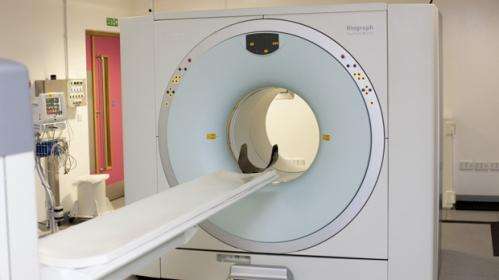New imaging approach fast tracks drug testing for incurable prostate cancer

Cancer Research UK-funded scientists have developed a new way to test the effectiveness of a drug for prostate cancer that has spread to the bone, which is currently incurable, according to research published in the Journal of the National Cancer Institute.
The researchers, based at the Cancer Research UK Cancer Imaging Centre at The Institute of Cancer Research, London, have successfully used a combination of imaging techniques* to see how a drug called cabozantinib can stop this type of prostate cancer growing in mice.
One great advantage of this approach is that the tumours closely resemble how prostate cancer develops in human bone. The ability to test these new treatments accurately offers huge potential for the use of drugs like cabozantinib in clinical trials.
Dr Simon Robinson, leader of the Radioisotope Physics team at The Institute of Cancer Research, London, said: "Until now we haven't been able to directly measure how effective treatments are for this type of incurable prostate cancer. But together these imaging techniques allow us to watch how the tumour and the surrounding bone are affected by new drugs.
"This approach can tell us how fast the cancer is growing and the potential impact on a patient's quality of life. Our work with the drug cabozantinib suggests it may provide pain relief in addition to stopping tumour growth. This method allows us to accelerate development of these promising new prostate cancer drugs from the laboratory to the clinic."
Prostate cancer affects around 41,700 men in the UK each year. Over 80 per cent of men will survive the disease for at least five years. But prostate cancer that has spread to the bone is much more difficult to treat.
Nell Barrie, Cancer Research UK's senior science communications manager, said: "Prostate cancer most often spreads to the bones, where it is currently incurable. We need this type of research to develop frontline treatments for prostate cancer patients. This approach will help us discover successful treatments more quickly and save more lives."
More information: Timothy J. Graham, Gary Box, Nina Tunariu, Mateus Crespo, Terry J. Spinks, Susana Miranda, Gerhardt Attard, Johann de Bono, Suzanne A. Eccles, Faith E. Davies, and Simon P. Robinson. "Preclinical Evaluation of Imaging Biomarkers for Prostate Cancer Bone Metastasis and Response to Cabozantinib." JNCI J Natl Cancer Inst dju033 DOI: 10.1093/jnci/dju033 first published online March 14, 2014















